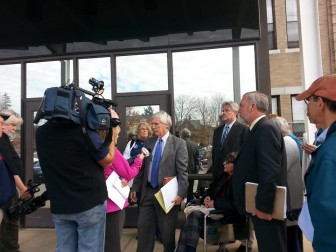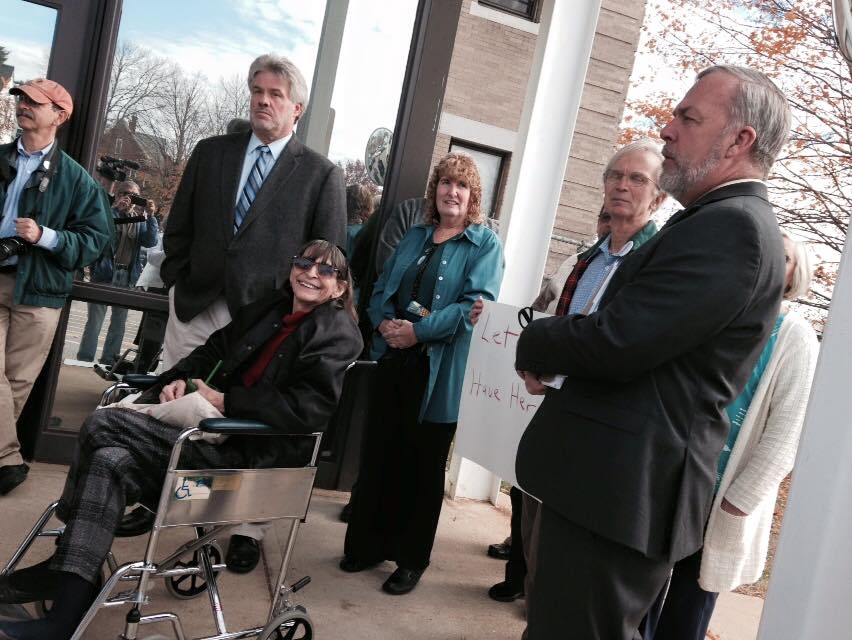
Gov. Maggie Hassan

Democratic Gov. Maggie Hassan responded through her spokesman today regarding Labor Activist Linda Horan’s request to help her and other sick people obtain medical marijuana now even though the state program won’t be ready to dispense it until some time in the first quarter of 2016.
And it wasn’t what Horan, who is in the final stages of terminal lung cancer or other people who qualify for legal medical marijuana, want to hear about the long-delayed state program.
“The Governor understands the urgency felt by many of the advocates and patients, and she continues to encourage everyone involved to work as quickly as possible to implement the program while following all state laws and regulations,” Hassan spokesman William Hinkle wrote in an email to InDepthNH.org.
Horan today sued the Department of Health and Human Services in Merrimack County Superior Court seeking relief. Video of Linda Horan asking Gov. Maggie Hassan to please open marijuana dispensaries: https://youtu.be/KNj_SwYtWe8?t=3m20s.
Rep. Renny Cushing said he hopes the Superior Court will provide Horan with relief. “The legislature does not want Linda Horan or any other patient to die without access to medicinal marijuana,” Cushing said.
“I hope the Superior Court will end what I see as cruel treatment of suffering people, uphold the law passed by the legislature … and issue an order to the Commissioner of Health and Human Services to issue cards to Linda Horan and every other qualifying patient.”
(See Hinkle’s full email at the end of this story, along with full remarks from state Rep. Renny Cushing and information from HHS’ website on how the program will be implemented.)
FULL DOCUMENTS:
William Hinkle’s full email: “Governor Hassan signed bipartisan medical marijuana legislation because she believes that it is the compassionate and right policy for the State of New Hampshire. As the State has worked to implement the infrastructure for this program from the ground-up, it has been critical to take the time to do this in the right way while following all state laws and regulations. The law that we have put in place — as approved by the legislature — requires ID cards to contain the ‘registry identification number corresponding with the alternative treatment center the qualifying patient designated,’ which prevents the issuance of these cards until the ATCs are open. The Governor understands the urgency felt by many of the advocates and patients, and she continues to encourage everyone involved to work as quickly as possible to implement the program while following all state laws and regulations.”
Statement of Rep. Renny Cushing in support of lawsuit filed by Linda Horan against the State of New Hampshire: “As a lawmaker who voted to treat patients with dignity and respect and allow therapeutic cannabis use, I am dismayed and outraged by the decision by the Department of Health and Human Services to withhold the issuance of patient registry cards that allow qualified New Hampshire patients to obtain and use medical marijuana. I hope the Superior Court will end what I see as cruel treatment of suffering people, uphold the law passed by the legislature 28 months ago and issue an order to the Commissioner of Health and Human Services to issue cards to Linda Horan and every other qualifying patient. The legislature does not want Linda Horan or any other patient to die without access to medicinal marijuana.” Cushing said.
Update on the state Department of Health and Human Services website on the progress of implementing New Hampshire’s medical marijuana law:
October 30, 2015
Pre-Registration
On November 2, 2015, the Therapeutic Cannabis Program will begin to accept applications from potentially Qualifying Patients and Designated Caregivers as part of a pre-registration period. All applications submitted during the pre-registration period must be completed in their entirety, and all required documents and the application fee must be included. As with the regular registration process, you will be notified in writing if your application is incomplete and when your completed application is approved or denied. Note, however, that the Program’s deadlines for notifying you of missing information, for approving or denying your application, and for issuing you a Registry Identification Card will not apply during the pre-registration period.
During the pre-registration period, if your application is approved, a Registry Identification Card will not be issued to you until the ATC you have selected receives authorization from the Program to dispense cannabis (the effective date of the card will be the issue date, not the approval date). The ATCs are expected to become operational in the first quarter of 2016. Once an ATC obtains authorization to dispense cannabis, the regular Program deadlines including the issuance of Registry Identification Cards shall apply for Qualifying Patients who select that ATC and their Designated Caregivers.
Follow the links on the side of the page for more detailed application instructions and program information.
Purpose and Mission
In June 2013 the New Hampshire Legislature passed House Bill 573 (Chapter 242 of the Laws of 2013), relative to the use of cannabis for therapeutic purposes. Governor Maggie Hassan signed HB 573 (RSA 126-X) into law effective July 23, 2013. RSA 126-X creates an exemption in state law from criminal penalties for the therapeutic use of cannabis provided that its use is in compliance with RSA 126-X. The NH Legislature placed the responsibility for administering the program within the NH Department of Health and Human Services. The Department’s primary responsibilities include:
- Maintaining a registry of, and issuing registry identification cards to, eligible qualifying patients who have been certified by their medical provider to have a qualifying medical condition and associated symptoms;
- Issuing registry identification cards to designated caregivers who are authorized to assist qualifying patients with the therapeutic use of cannabis; and
- Issuing registration certificates to a maximum of four alternative treatment centers in the state for the cultivation, production, and dispensing of cannabis to qualifying patients, or their designated caregivers.





